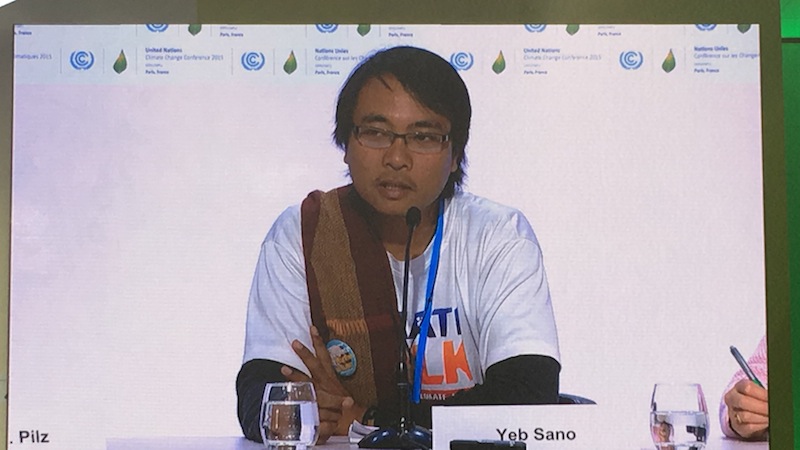By Yeb Saño
Former chief climate negotiator of the Philippines
When governments were scrambling in the dying days of the COP21 climate summit in Paris to forge a new climate agreement, Typhoon Melor (Nonoy) was approaching the Philippines, again quite uncharacteristically a few days before Christmas. As the world politicians continued to celebrate the agreement, the out‑of‑season storm left many communities in shambles. This leads us to reflect on how words on a piece of paper crafted in diplomacy matter little to real people on the ground confronting climate impacts.
As the euphoria over COP21 gradually subsides, we can look at the outcome more soberly and not with the abruptly rose-tinted glasses that many seemed to have viewed the Paris conference result.
We must welcome the Paris Agreement as a way for the international community to take significant albeit small steps forward in confronting the climate crisis. It is after all quite a miracle in itself, forged in the nick of time, salvaging a tremendously convoluted negotiations process. The process through which this accord was painstakingly crafted was also a manifestation of a triumph of effective stewardship by the French hosts. But we should guard our sense of jubilation and keep the champagne in the glasses and drink it coyly instead of unreservedly popping the cork and showering everyone with it. Why? Because because the Agreement is not just far from being perfect; it is far from what the world requires.
While the preamble contains keywords that can make climate diplomats declare triumph, real people and communities on the ground impacted by the ravages of climate disruption and fossil‑fueled development aggression, would find this tokenism woeful. The delegations that agreed to this outcome cannot take sanctuary under a diplomatic resolution that risks trivializing the suffering of the world’s poorest and most vulnerable.
The word “commitment” does not appear on the Paris Agreement. This is so because the most powerful nations on earth, developed and developing alike, refused to use this word in order to achieve a political compromise that would be expedient for governments. The endeavor of the United Nations was to enhance the implementation of the 1992 climate treaty. Instead, compounded by serious inaction, it has slipped and stumbled over the years. The Paris Agreement is a weaker agreement than the 1992 Climate Change Convention. It is also weaker than the 1997 Kyoto Protocol. What this agreement represents is the sheer avoidance of rich countries to be accountable for the climate crisis and the acquiescence of others to the weakening of the climate regime, again gravely ignoring the importance of equity, fairness, adequacy and ambition.
The issue of “loss and damage” was clearly a lost cause when rich countries treated it with perfunctory interest, and was even further lost with the brutal qualifier that the issue “does not involve or provide a basis for any liability or compensation”.
Promises are best measured by how one proposes to do achieve them. On this count, the agreement is big on goodwill, but very scarce on concrete actions that can make good on the promises. On the means of implementation, the accord merely rehashes previous agreements and rich countries were again hugely reluctant to boost the scale of financial resources to bolster the transformation of the global economy that will save the climate, allow human and natural ecosystems to cope, and that would address the development crisis. Treating the promise of the inadequate US$100Bn per year by 2020 as a floor is no reason to be ecstatic because climate finance is already watered down by definition, and how we even get to US$100Bn is an enigma, with only 10% of this amount pledged so far, with many strings attached. As to ambition, the aim of strengthening the global response by “holding the increase in the global average temperature to well below 2 °C above pre-industrial levels and to pursue efforts to limit the temperature increase to 1.5 °C above pre-industrial levels” is again a diplomatic sleight of hand to appease the clamor for higher ambition but falling back on a six year old agreed threshold.
Heralded as the ‘start of a new beginning’ and the spark of a continuing process, it is global procrastination notwithstanding. If we are to be truly honest about the Paris Agreement, we will see why the Paris Agreement is a shameless euphemism for the betrayal of the world’s most vulnerable. It is akin to a new year’s resolution. It is high on promises, but suspect on realization.
Do we remain hopeful? Indeed our hearts are filled with hope, because even if the Agreement changes some things, the people will change everything. Despite being treated largely as spectators on the sidelines, the global movement for climate justice has put itself at the forefront, and has become stronger than ever. And especially for people of faith, the beautiful awakening marches on.
Nations have shown some glimmer of hope for confronting the climate crisis, and we must continue to be watchful and push our leaders to move swifter and bolder. Indeed, it may be just the start of a new beginning. The journey continues, and every step counts. Another world is possible, and we will be unstoppable.
Latest posts by EnviroNewsph (see all)
- Global fund aimed at protecting nature and accelerate investment in conservation, launched in Canada - August 25, 2023
- Why ‘loss and damage’ is the most bitterly fought-over issue at COP27 climate talks? - November 18, 2022
- U.S. hands over P2.3M in equipment and wildALERT system to PH to protect wildlife - December 16, 2020

